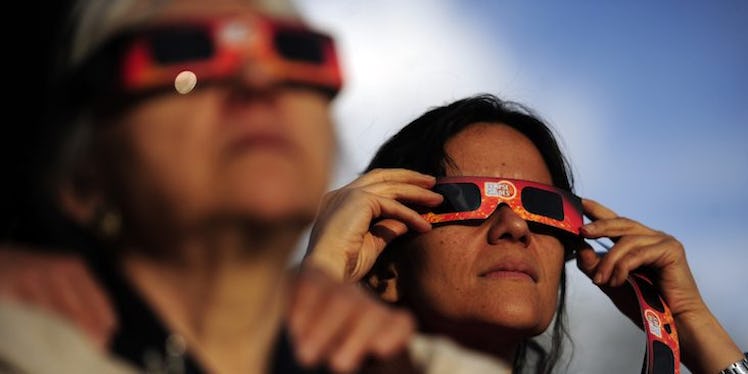
Here’s How You Can Tell If You Damaged Your Eyes Watching The Solar Eclipse
The solar eclipse of 2017 happened on Aug. 21, 2017, and the whole world stopped and looked up for a moment. It was a super epic celestial event for those who prepared. I personally used a cereal box and all I saw was a white blur. It was a bummer. So were you one of the lucky ones that ordered solar eclipse glasses on Amazon before they sold out? Or did you look directly into the sun like a dumb-dumb? Here's how you can tell if you damaged your eyes watching the solar eclipse.
NASA explains on its website,
Looking directly at the sun is unsafe except during the brief total phase of a solar eclipse ('totality'), when the moon entirely blocks the sun's bright face, which will happen only within the narrow path of totality. The only safe way to look directly at the uneclipsed or partially eclipsed sun is through special-purpose solar filters, such as 'eclipse glasses.'
According to Dr. B. Ralph Chou, president of the Royal Astronomical Society of Canada and a former optometry professor, there are no pain receptors in the retina, so if you stare at the sun all day, you won't be able to feel a thing. Yikes. Sounds tricky.
Chou also mentioned in an article from TIME,
If you don't try to sneak a peek without the filter... Then you should not run any risk of being hurt.
If you looked into the sun for a long period of time (which, why would you do that?), you may not notice any effect until 12 hours after viewing the eclipse. People have been known to wake up and their vision is altered; they have eye pain and sensitivity to light. Overall, not good.
So, have you noticed your vision is a little different? Do things look fuzzy? You may have damaged your retina. If so, you may want to follow advice from Dr. Linda Chous, chief eye care officer for UnitedHealthcare. She told NBC Chicago,
Visit a local eye care professional for an exam if you or a family member experience discomfort or vision problems following the eclipse. It is important to note there can be a delayed response to any damage incurred during an eclipse, with symptoms showing up hours later.
This is serious people! Solar eclipses are dangerous. Who knew?